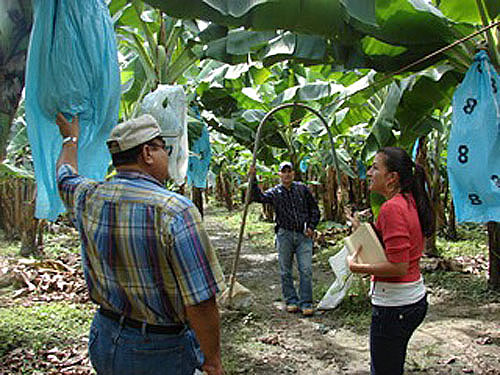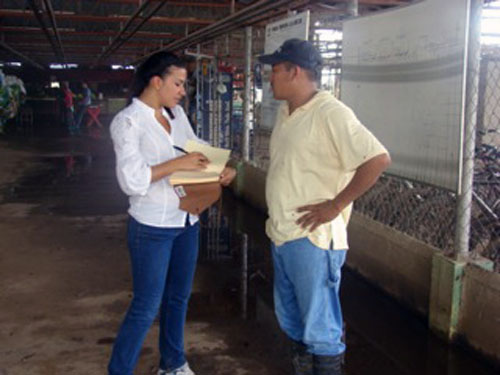
Editor’s Note This article focusing on Honduras is the fifth in the World-At-Home series, in which we posit that it’s possible to “travel” around the world without leaving San Diego County, through visits to local venues and interviews with San Diegans involved in diverse foreign projects.
By Donald H. Harrison

SAN DIEGO – When Tamar Benkazen Koosed was a graduate student at UCSD’s School of International Relations and Pacific Studies, she impressed Professor Richard Feinberg so well that he recommended her to the U.S. State Department as an independent researcher.
After receiving her master’s degree in 2009, moving to Los Angeles, having a big Sephardic Jewish wedding in her native city of Manaus, Brazil, to former San Diegan Philip Koosed, and forming the Manaus Consulting Group, Tamar Benkazen Koosed landed a contract to evaluate the work of Business for Social Responsibility (BSR) teams in various Central American countries. BSR’s work was funded in large part by a U.S. State Department grant.
One of these teams worked at the 578-acre Finca Tropical S.A. plantation in La Lima region of Honduras to develop more productive relationships between management and the company’s 217 employees. As the BSR team was concluding its work, Koosed flew in March 2010 to San Pedro Sula, the second largest city of Honduras, and then drove two hours by jeep to Finca Tropical in order to interview BSR team members and workers from the Honduran partnership agency known as FUNDAHRSE (Fundación Hondureña de Responsabilidad Social Empresarial), as well as managers and the workers at Finca Tropical.
Bananas comprise an important cash crop for Honduras; however, the industry has been beset with problems. In some years there has been labor unrest, and in other years labor apathy, with workers feeling little stake in the growth or success of the companies for which they work. Koosed said this sense of disengagement often expressed itself in the idea that “I’m a worker, I’m paid a wage, I go home when my shift is over, what I think makes no difference to anyone.”
The BSR team that preceded Koosed to Honduras worked to change that attitude, stressing to management that workers who are recognized as vital contributors to the process often will suggest ways to improve production that can add to management’s bottom line. The BSR team suggested that if Finca Tropical S.A., through an active communications program, let the workers know that their input not only was welcomed, but potentially could result in higher wages, many benefits might accrue. With Chiquita Bananas, Finca Tropical’s main customer, calling on the Honduran banana industry generally to improve labor relations, Finca Tropical’s owner, José Obregón, was willing to participate in the experiment.
One measure of the program’s impact was the warmth with which Koosed said she was greeted upon arrival at Finca Tropical’s plantation.
The supervisory personnel with whom she met were “people who have worked in the banana industry for a very long time, and they are very passionate about it,” Koosed recalled in an interview. “They know everything about the fruit and about the different animals and weather conditions that impact the fruit. These are people who grew up around banana farms, and have worked there for many years, and they are very passionate about planting, about how the fruit develops. They have a special relationship with the plant, the tree; and they want to tell you all about it, all the different phases of it.
“They also were very excited about the project, wanting to tell me everything that has been going on with the project, their opinions, and how it opened their eyes to different communication mechanisms, to different avenues of communicating with the workers.”
She described the plantation as being “very peaceful, though very hot. The banana trees provided a very nice shelter from the sun, with their long leaves.”
In her report, Kossed noted that among BSR recommendations to management had been such suggestions as
* “Develop together with the workers’ committee the firms vision, mission, and values, as well as disseminate these concepts internally to reflect the company’s commitment…”
* “Continually invest in worker training.”
* “Formally plan for annual projects with the community and engage in strategic partnerships in the surrounding areas.”

Koosed met with the workers in two different venues – out in the groves, where they were using machetes to separate the banana bunches from the trees, and in the packing sheds, where they divided the bananas into smaller, manageable bunches, washed the fruit, labeled and packed it.
The researcher recalled that she was particularly impressed with the system of cables and guide wires strung throughout the banana groves, enabling workers to cut down large bunches of bananas and then attach them to the cables. The bunch is also tied to the waist of the worker, who then walks toward the packing shed, causing the bananas to trail behind him on a guide wire. “The whole farm is wired!” she said.
Typically one finds men in the groves, and women in the packing houses, but this division of labor is not mandatory, Koosed said. In interviewing the workers, the promise of confidentiality was quite important. “We don’t use workers’ names if they don’t want us to use them—that is very important,” Koosed said. She also assured the workers “I wasn’t hired by your boss.”
Before she would start the formal interviews, she would chat with the workers about their families and about the nature of their jobs. As a woman who grew up in a Jewish family in Manaus, Koosed knew how “shmoozing” can help put people at ease.
Sometimes questions can touch upon personality conflicts or other problems in the worker’s environment. Koosed said she felt she needed to “make them feel comfortable giving you information.” To make certain such information was reliable “is why you have to do multiple interviews, cross-check the facts, triangulate the interviews and document everything to understand and come up with the right perspective.”
The 27-year-old researcher said neither her relatively young age, nor her gender, was any hindrance in Honduras, although in other Central American countries she would sometimes be cautioned about the dangers facing a woman out on her own. More problematic in Central America was the fact that the study she was doing was paid by the U.S. State Department—relationships between Central American countries and the United States still being “convoluted,” according to her description.
“Being a Brazilian was really helpful for me,” she said, adding she let people know right away that she was a fellow Latin American, with a command of Spanish, English and French in addition to her native Portuguese.
Koosed noted that there is some resentment in the banana industry in Central America against the U.S. because big American companies like Chiquita (formerly United Fruit), Dole and Del Monte—in the face of political turmoil, labor unrest and hurricanes –sold off their properties, rather than staying engaged in the country. Though private entrepreneurs have tried to fill the vacuum, the departure of the big American companies left some turmoil and uncertainty in its wake. Add to this the perennial complaint in Latin American countries about “Yankee Imperialism,” and it’s important to tread lightly whenever the subject of international politics comes up.
The researcher said that as she conducted her interviews, she came to the conclusion that opening up communications with the employees had been “an eye opener to the management”
“If you engage with workers more frequently and have a more amicable relationship with workers, you can create an environment where they can talk to you about problems on the farm and give you ideas how to improve it,” she said.
“They (managers) were really amazed and excited and they were implementing the recommendations given to them – having meetings every so many weeks, telling workers about the production of the farm (this is how many boxes we packed this week) and keeping up with those goals to get employees excited about the progress of the farm. They really enjoyed it and found it very valuable to engage with workers at a deeper communication level.”
Before Koosed would say absolutely that Finca Tropical had undergone a change in corporate culture as a result of the BSR project, she said she would need to see that the practices have endured. But during her evaluation tour, at least, the company appeared headed in the direction of more collaboration with its workers.
Some of the ideas that the workers offered were fairly detailed and technical, for example, “how to cut the banana better,” Koosed said.
Previously, “whenever the managers wanted to create a change in policy, or the way they were doing something, it had been difficult to get a buy-in from the workers. The changes wouldn’t get implemented. Now, according to the managers, it is easy to talk to the workers, make the changes and see them being implemented.”
Plantation owner José Obregón is part of an owners association that has been closely monitoring the project. “I left Honduras with a feeling that Sr. Obergon would make sure that he disseminated the results of the project,” Koosed said.
*
Harrison is editor of San Diego Jewish World. He may be contacted at donald.harrison@sdjewishworld.com